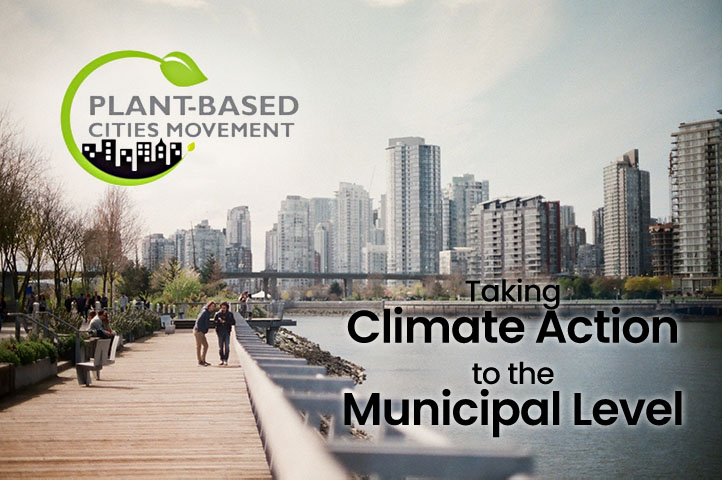In response to recent reports of the IPCC indicating that time is running out to prevent catastrophic global warming, the Plant-Based Cities Movement (PBCM) was launched. The objective of the PBCM is to ask cities across Canada, and eventually beyond, to help combat the climate crisis by moving toward plant-based foods at their city halls, facilities, and events.
Many cities have already put together a climate action plan. Those plans tend to focus on transportation, fossil fuel and infrastructure changes, which are steps that take significant time and resources to implement. The idea of making different food choices is often missed, despite the fact that it can be actioned quickly and inexpensively.
The PBCM exists to help local groups and municipal residents approach their city councilors to ask for change in food purchasing strategies. There are groups active in more than a dozen cities across Canada, and PBCM is looking for more.
It all starts with an “ask”. For example, an ask can be that a city shifts 50% or more of its animal-based food purchases to plant-based food purchases by the end of a year. The ask is determined by the local group based on the specific context in which its municipality operates. PBCM assists the local group by providing guidance, mentorship, and resources such as sample letters and presentations to council on the benefits of moving away from animal-based foods and direction on how to do so.
There are cities across the world already taking action:
- As part of the C40 Cities Good Food Declaration, 14 cities have committed to “supporting an overall increase of healthy plant-based food consumption in our cities by shifting away from unsustainable, unhealthy diets”. The cities signing the declaration are Barcelona, Copenhagen, Guadalajara, Lima, London, Los Angeles, Milan, Oslo, Paris, Quezon City, Seoul, Stockholm, Tokyo, and Toronto. The pledge was made at the C40 World Mayors’ Summit in Copenhagen. The City of Montreal recently voted to join this group as well.
- Cities such as Vancouver, Berkeley, Amsterdam, Brampton, Kitchener and Helsinki, and the County of San Diego are taking positive steps towards increasing their plant-based purchasing.
People can take a step beyond the individual level. It is within our power to make change in our communities by accelerating the transition to a plant-based food system. Our mayors and council, as community leaders, can play a significant part in this change. They may just need a nudge from some municipal residents and the PBCM is here to help with that. Two Earthsave Canada members, along with several other committed activists across the country, are working to nudge their municipalities. We look forward to having more Canadians involved and making change that benefits our planets, our health and the animals.
To learn more about PBCM, check out our recent Virtual Speaker Series with PBCM members Mo Markham and Eleanor Carrara:
Photo by Kyle Ryan on Unsplash








